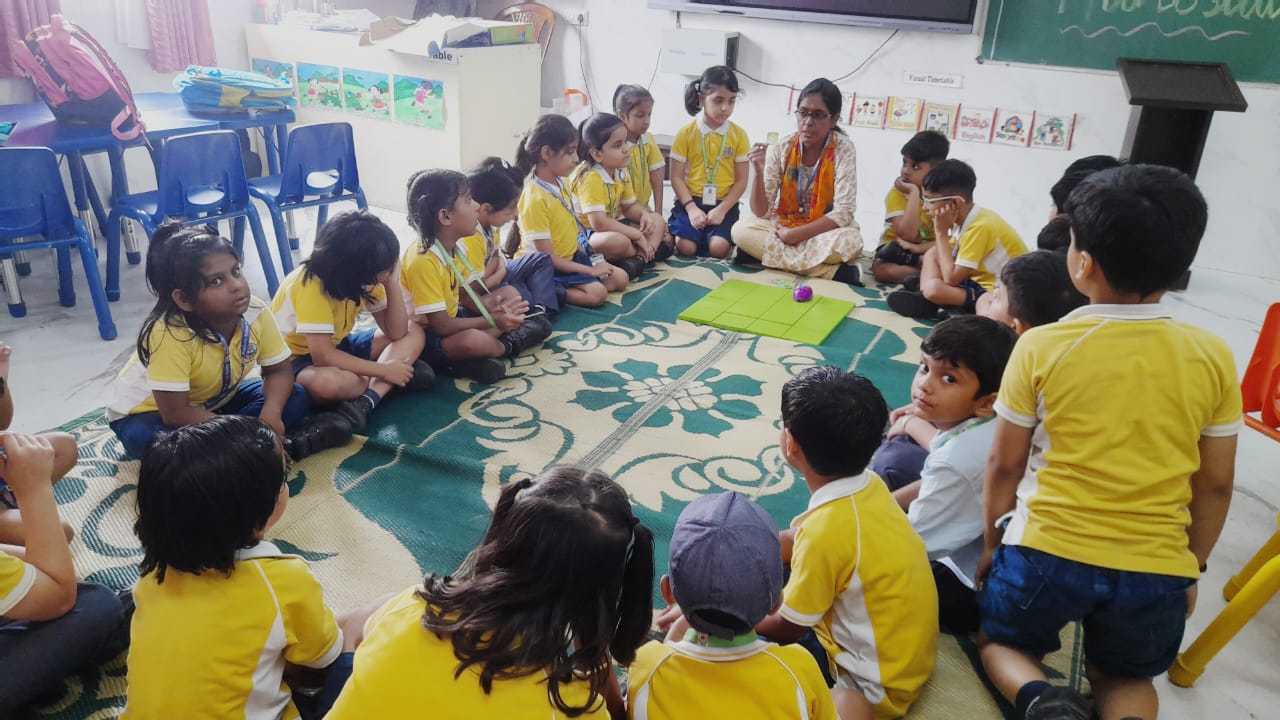IGNITE The Joy of Learning
The Joy of Learning
Ignite represents the heart of our academic curriculum. Across all stages, we nurture curiosity, creativity, and confidence while preparing learners for the future.
Pedagogy:
Our approach is experiential, inquiry-driven, and competency-based. We blend structured academics with hands-on projects, STEM exposure, art integration, and cultural grounding. Every stage is scaffolded to ensure skills of creativity, collaboration, critical thinking, and communication grow stronger year by year.
Foundational Stage (Nursery – Grade II)
Pedagogy: Play-based and experiential learning that transforms children into explorers, problem-solvers, and joyful learners.
Learning Focus: Joyful play, storytelling, experiments, nature walks, and creative expression. Children build strong foundations in language, numeracy, and social-emotional growth while discovering the world around them.
Academic Framework
Main Subjects - English, Hindi, Math, EVS
Additional Subjects - Music, Dance, Art & Craft, Life Skills, Quality Circle Time, Games.
LEARNING THROUGH EXPERIENCE
- Little Agriculturist – Children grow their own vegetables—planting, caring, and harvesting—while learning responsibility, teamwork, and sustainability.
- Entrepreneurship for Kids – Through pretend shops, role play, and creative projects, children explore planning, innovation, and value creation in a fun and playful way.
- Early Engineering Kit – Hands-on STEM challenges encourage collaborative problem-solving and scientific thinking.
- Science Experiments – Hands-on exploration to observe, question, and connect theory with real life.
- Jodo Gyan – Concrete tools and real-world applications make math engaging, logical, and deeply understood from the early years.
LANGUAGE, LITERACY & EXPRESSION
- Pronunciation Lab – Audio-visual aids and repeated practice refine articulation and enhance clarity of speech.
- Reading Program – Personalized book choices with facilitator support improve comprehension, vocabulary, and reading confidence.
- Art-Integrated Learning – Dance, music, theatre, and role play connect academics with Indian art and culture.
- Listening & Speaking Development (LSD) – Structured sessions create confident communicators for academic and social settings.
- Make Your Questions – Chapter-based activities build inquiry skills and deeper engagement.
- Vocabulary Building Words – Learning new words from each chapter to enhance language skills.
- Conversation Corner – Guided dialogues to develop listening and speaking fluency.
- Grammar Corner – Fun activities to strengthen grammar and apply it in real communication.
- Storytelling, Puppet Shows – In pre-primary education fosters language development, creativity, and emotional intelligence while engaging young learners and promoting a love for reading.
EXPLORATION & DISCOVERY
- Escape Room Challenges – Problem-solving adventures that boost logic and perseverance.
- Gallery Walk – Visual presentations in science and social studies for peer learning and communication skills.
- Shape Walk – Real-world shape hunts to make geometry fun and practical.
- Nature Walk – Observing plants, animals, and natural patterns to connect with the environment.
- Math Walk – It encourages children to explore and apply mathematical concepts in real-life settings, developing problem-solving skills and spatial awareness.
DIGITAL & CREATIVE TOOLS
- Computational Thinking – Screen-free coding concepts using Robot Mouse to develop sequencing, problem-solving, and early coding skills.
- Khan Academy Integration – Adaptive learning in math and science that supports mastery at each child’s pace.
EMPOWERING MINDS THROUGH ACADEMIC ENGAGEMENT
Beyond books, we offer interactive learning journeys, programs, and activities that promote academic excellence, foster bonding and sharing, and enhance both fine and gross motor skills.
- Grip Activity & Test – Children develop fine and gross motor skills through tear & paste, crumpling, tracing, lace-ups, cutting, and sand play. Monthly tests help track progress and provide timely correction.
- Hand–Eye Coordination – Activities like pouring, mala making, sorting, sand play, origami, dip & print, and clapping games enhance coordination and focus.
- Circle Time – Morning circles include self-introduction, “Aaj ki Taja Khabar,” Me & My Mood and gratitude sharing. This builds speaking skills, confidence, and positive social interaction.
- Bye–Bye Circle – A joyful wrap-up with revision of the day’s learning, neatening up, prayer, and free dance. This encourages reflection, discipline, and joy.
- Kiddies Kitchenette – Children explore non-thermal cooking and learn about ingredients in a fun, safe way. It nurtures healthy eating habits and independence.
- Recipe Game – A sequencing game using picture cards to arrange steps of a recipe. Builds logical thinking, order sense and memory.
- My Pride – India – Introduces children to basic facts about our country. Fosters love, respect, and a sense of belonging to the nation.
- Sunrise and Sunset – Children record the time of sunrise and sunset, observing how the duration of daylight changes over days and seasons.
PLAY & INDEPENDENT CHOICE
- Educational Play Corners – Reading, art, music, kitchen, and activity corners that promote decision-making, cooperation, and creativity.
- Interactive Learning Tools – KPL Kits, Word/Picture Ladders, Pocket Charts, and Flash Cards for hands-on engagement.
PARENT PARTNERSHIP
We believe learning is strongest when school and home work together. Parents are engaged through:
- Participation in nature programs, reading sessions, and thematic events.
- Access to digital resources (Google Classroom, videos, assignments) for at-home reinforcement.
- Holistic progress cards that track emotional, social, and academic growth—not just marks.
Policy for FAQs and Responses from Admin/Teachers to help families understand the classroom activities in Kindergarten
Play is a developmentally appropriate way to learn at this age. When they build with blocks or play pretend, they’re building vocabulary, math skills, and problem-solving.
We’re building the foundation for reading, like recognizing letters, hearing sounds in words, and loving books. Skipping those steps often causes problems that are harder to fix later.
Formal writing requires strong fine motor skills (hand muscle strength) and hand-eye coordination, which your child is actively developing right now through play. Activities like cutting with scissors, playing with playdough, and stringing beads are all 'pre-writing' exercises. We focus on building that essential foundation first, because it makes them developmentally ready to write.
Sensory play, like playing with sand and water, is deeply educational. Mathematically, they are exploring volume and measurement ('How many scoops will fill this bucket?'). Scientifically, they are testing hypotheses about how things flow or feel. And for fine motor skills, they are developing wrist and hand movements while scooping, pouring, and manipulating tools. It’s hands-on learning that engages multiple senses at once. Multi-Sensory Learning and Early Math/Science Concepts. Play is a natural way to experiment and learn core concepts.
Block play is fundamental to learning as it helps. When building, your child in developing problem-solving skills, spatial reasoning (key for math and science), and early engineering concepts. When playing with others, they are also practicing social skills, language skills, and cooperation. Blocks are a highly effective, hands-on learning tool. Cognitive Skills (Spatial Reasoning, Problem-Solving) and Social-Emotional Development (Cooperation, Communication)..
Outdoor and large-motor play is critical for overall school success. Gross motor skills (big body movements) strengthen the core and shoulder muscles, which in turn provides the necessary stability for their hands to sit and write later. Movement is also essential for brain development and helps children regulate their emotions, which allows them to be more focused and attentive when it is time for quiet activities. Brain-Body Connection and Self-Regulation. Physical activity prepares the body and mind for focused, academic tasks.
Pretend play, or Dramatic Play, helps in developing language skills by creating dialogue and stories, expanding their vocabulary, and learning to see things from another person's perspective (empathy and social skills).
Singing and rhyming are a crucial part of developing phonological awareness, which is a core pre-reading skill. When children hear and manipulate sounds in words, it lays the foundation for understanding letters and reading. The actions and rhythm help build memory and attention spans!
Scribbling is the start of artistic and writing development! We celebrate those scribbles because they show that your child is developing control over their pencil grasp and expressing their ideas. This stage is about process, not product. As their fine motor skills mature, their drawings will naturally progress from scribbles to recognizable shapes, which we call emergent representation.
Learning to use scissors is one of the best exercises for strengthening the small muscles in the hand that are used for writing. It also requires complex bilateral coordination (using both hands together). Neatness isn't the goal yet; the focus is building the hand strength and coordination they'll need for pencil control later on. Fine Motor Strength and Bilateral Coordination. Cutting is a direct physical preparation for writing.
That 'mud' or paint mixing was a fantastic science lesson! Your child was learning about color theory (primary colors make secondary colors) and exploring texture and viscosity (how thick or runny a substance is). Messy, open-ended play encourages creativity and allows for crucial, self-directed scientific experimentation.
In the classroom, clean-up time is a key opportunity to develop executive function skills. This includes following multi-step instructions, practicing organizational skills, and demonstrating responsibility. It also builds a sense of community—we take care of our shared space together.
Repetition is how young brains learn! Hearing the same stories multiple times helps children grasp vocabulary, anticipate the plot, and understand the structure of a narrative. It builds confidence and develops early comprehension skills essential for reading fluency.
That persistence is wonderful! Learning to tie shoes or manage a zipper is called a self-help skill, and it significantly builds self-esteem and independence. We encourage them to keep trying because the struggle itself improves their fine motor dexterity and their ability to stay focused on a long task. Self-Esteem and Independence (Autonomy). Self-help skills are complex fine motor tasks.
Absolutely! Puzzles and sorting games are 'serious math' at this age. They teach classification, pattern recognition, and one-to-one correspondence (the idea that one object equals one count). These hands-on activities are the building blocks for abstract math concepts like addition and geometry later on.
Social skills are primarily taught through guided, real-time interactions in the play setting. We coach them on sharing, turn-taking, and emotional regulation ('How does your friend feel when you take that toy?'). Our job is to facilitate positive interactions and model appropriate language for expressing feelings and resolving conflicts.
 The Joy of Learning
The Joy of Learning 




.jpeg)
.jpeg)
.jpeg)
.jpeg)
.jpeg)
.jpeg)
.jpeg)
.jpeg)
.jpeg)
.JPG)
.jpeg)
.jpeg)
.jpeg)
.jpeg)
.jpeg)
.jpeg)
.jpeg)
.jpeg)
.jpg)
.jpeg)
.jpeg)
.jpeg)
.jpeg)
.jpeg)
.jpeg)
.jpeg)
.jpeg)
